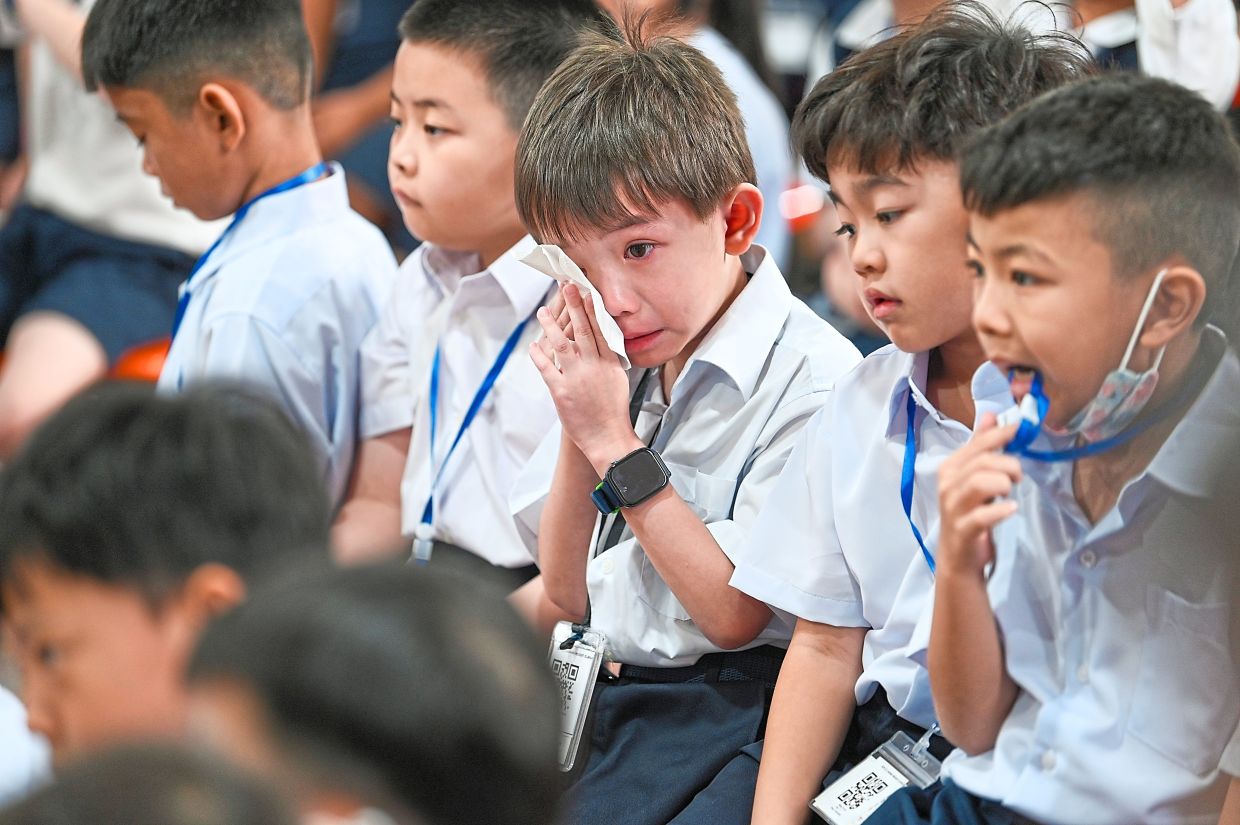 |
Children admiring a Hokkien glove puppet
theatre performing 'Journey to the West' on a portable wooden stage at
the Little Penang Street Market.
|
Its decline has been progressive, but Penang’s Hokkien heritage is at its closest to death’s door as 2019 takes off.
LAST week, I returned to my hometown, Penang, to celebrate Chinese New Year. The family reunion meal with my father (who turns 94 this year) and (87-year-old) mother is an annual event I always look forward to.
It’s not possible to have my brothers (now in their mid-60s to 70 years old), their wives, children and grandchildren with us at the family event every time, but we get as many of them as we can. I have made it a point to host these pre-CNY meals because for the last few years, I have avoided being in Penang during the first two days of the actual celebrations.
That’s when Penang island’s roads get choked up and traffic comes to a complete standstill, the city desperately dealing with the homecoming of Penangites and tourists, especially during the second day of CNY.
The temperature on the island during the CNY season always seems to spike and at times, the scorching heat is almost unbearable. And that’s another reason why I withdraw from the otherwise lovely island during this festive period. As much as I yearn for my Penang hawker fare, I don’t want to jostle for a plate of char koay teow with tourists. But on this recent trip home, it hit me that I have become a stranger in my proud Hokkien-speaking island. The loss of the distinct northern-accented Hokkien has been apparent in the last few years but now it looks like its death may come sooner than feared.
It’s worse for a “banana” like me – a term to denote a person of Chinese origin who can’t speak or write Chinese, and instead, identifies more with Western culture. The term is derived from the fruit, which is “yellow on the outside, white on the inside”.
Those like me are regarded a disgrace to the Chinese-speaking community because I can’t read or write Chinese or speak Mandarin.
Their horror turns to disgust when I confess that I can’t even write my name in Chinese.
My decade of education was at St Xavier’s Institution, a Catholic establishment, and despite the religious background of the premier school, it had a liberal and open- minded culture that moulded most of its students, and this, us former students are enormously grateful for and proud of.
The multi-ethnic mix of the school’s population also means we had real friends from all races, developed and tested over a decade. So we always felt sorry for those who studied in Chinese, Tamil or Islamic-based schools then, because we felt their set up was mono-ethnic. And no matter how much the products of these schools claim they had friends from other races, we know they didn’t have the deep ties or bonds that those of us in English-medium schools developed.
Fast forward to 2019! Just like The Last Of The Mohicans – the James Fenimore Cooper historical novel realised in the 1992 movie about the last members of the dying Native American tribe, the Mohicans – it dawned on me last week that I could well be among the Last Of The Bananas in Malaysia.
At the Air Itam wet market, I asked for the price of the thee kuih, or kuih bakul, in Hokkein and the stall keeper, in turn, replied: “Oh, nee yau (you want) nian gao.”
A few steps away, another trader was loudly hawking ang pow packets, which, in previous times, would be referred to as “ang pow long” (red packets), but this time, I was hearing “hong bao feng”.
By the time I sat down at a coffee shop, the waiter was already taking down my order, again, in Mandarin, and quoting prices in that language, too. It was no longer “kopi” but “ka fei” now.
If there’s one clear feature that separates Penangites from the rest of the ethnic Chinese in Malaysia, it has always been the melodious Hokkien, with its rich sprinkling of Malay words that reveals its nonya-baba linguistic roots.
Penangites – at least from the older generation – are fiercely proud of their Hokkien, as it completely differs from the one spoken in Singapore, Taiwan or Xiamen in China, and even that in Melaka or Johor. Call us smug, snooty or parochial but we sometimes dismiss the Hokkien spoken elsewhere as somewhat crass and unrefined.
Only the Hokkien spoken by the Chinese in Medan closely mirrors Penang Hokkien, presumably because of the proximity between the island and the Indonesian city.
Whether rightly or wrongly, or plainly out of ignorance, Penangites feel the sing-song delivery is easier on the ears.
Words such as balai (police station), balu (just now), bangku (stool), batu (stone), cilaka/celaka (damn it), campur (to mix), jamban (toilet), gatai/gatal (itchy) gili/geli (creepy), sabun (soap) and kesian (pity), are an integral part of the Penang Hokkien dialect.
If the person is not from Penang, then he or she is likely from Kedah, Perlis or Taiping in Perak, to be able to converse in the northern-accented Hokkien. Which brings me to my point: As the daily use of the dialect is rapidly being replaced by Mandarin, I am feeling the impact the most. It is worse for the “bananas” who are feeling lost and out of place – in their home town.
It doesn’t help that many of the present Penang state and federal leaders aren’t from Penang, having been born and raised in either Melaka, Johor or Selangor.
The Penang Monthly bulletin, in its May 2017 issue, dramatically headlined the situation: “Penang Hokkien on life support”.
In an interview with the publication, Penang Hokkien Language Association secretary Ooi Kee How lamented that “our creativity, our cultural identity, will decline. A lot of innovations will disappear, because different languages shape the way we think differently.”
But the wide use of Mandarin and the decline of the dialects is not just endemic to Penang. Cantonese is spoken less in the Klang Valley, too, and is suffering the same sad fate as northern Hokkien. The random stranger who calls up, irritatingly “inviting” us to take up a loan having been “specially selected”, speaks to me in Mandarin because it’s assumed I can speak the language since I have a Chinese name. Likewise, the sales staff who stops us at the shopping mall also speaks to me in Mandarin, likely led by the same deduction.
So, as a “banana” who thinks and dreams in English, I am starting to suffer from anxiety. I am embarrassed by my inability to communicate in an important language – with huge economic value – and worse, the national language of my ancestral country.
At the rate, the Chinese language is being used, even by non-Chinese, I fear that I will be regarded illiterate in future. “Bananas” in the past ridiculed and mocked the Chinese-educated for not being able to speak English sufficiently, or roll their tongues well enough to produce the “r” sound, but now, it looks like the tables have turned on the “bananas”, instead.
A whole generation of Malaysian Chinese has been educated in Chinese schools, at least at primary level. It has been widely reported, from various surveys, that up to 90% of Chinese parents send their children to Chinese primary schools, and the balance to national medium schools.
As I have written here before, this is unlike the experience of the older generation of Penangites like me, now in their 50s, who attended schools using English as a medium of instruction. In the absence of Mandarin, we spoke mainly Hokkien and English, but people in their 30s and 40s are more comfortable conversing in Mandarin, and certainly not English.
Then there is the huge impact of Chinese TV shows, especially on Astro. They are entirely in Mandarin – with shows from mainland China and Taiwan – and Hokkien, which is spoken in a manner closer to that used in Melaka, Johor and Singapore.
It’s no surprise that the sales staff at malls also expect the Chinese community to speak Mandarin, and understandably, they will begin the conversation in Mandarin – because you are expected to know the language.
There is also the impact of China as the new economic powerhouse of Asia, if not the world. Mandarin has become the dominant language with economic value, and certainly prestige. That’s how it is now, but this may well come at the expense of a rich heritage.
The harsh reality is that the unique “sing-song” style of Penang Hokkien might no longer be heard decades from now if this frightening trend continues. Even worse, what’s certain is that the “bananas” will be history very soon.
Well, what can I say, except to wish you “xin nian kwai le” (happy new year) and “gong xi fa cai” (may you attain greater wealth) this festive season!

by Wong Chun Wai On The Beat
Wong Chun Wai began his career as a journalist in Penang, and has served The Star for over 27 years in various capacities and roles. He is now the group's managing director/chief executive officer and formerly the group chief editor.
On The Beat made its debut on Feb 23 1997 and Chun Wai has penned the column weekly without a break, except for the occasional press holiday when the paper was not published. In May 2011, a compilation of selected articles of On The Beat was published as a book and launched in conjunction with his 50th birthday. Chun Wai also comments on current issues in The Star.
Related post:
槟城人(Penang Lang) - Home | Facebook
Feeling increasingly displaced in Penang, too DATUK Seri Wong Chun
Wai’s article expressed my sen...
Related:


















